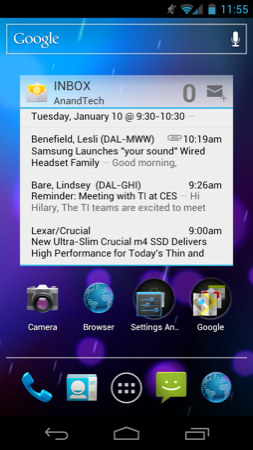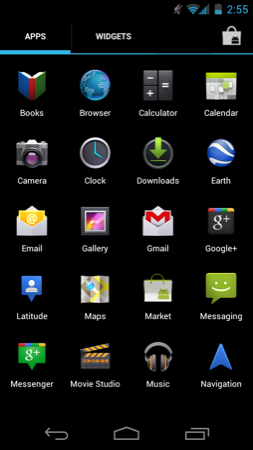Samsung Galaxy Nexus & Ice Cream Sandwich Review
by Brian Klug & Anand Lal Shimpi on January 18, 2012 1:34 PM ESTGoogle employs more than 20,000 people worldwide and the number of them working on Android are in the single digit percentage range. Google's business is search, but it has always had aspirations of more. Android isn't just a chance to capitalize on mobile search for Google, it's also an opportunity to grab power in the next era of personal computing. If you believe that smartphones will eventually replace mainstream PCs, who wouldn't want to be to smartphones what Microsoft was to PCs in the early 1990s?
Previous versions of Android have been cautious, evolutionary steps along a path to being a more open/flexible alternative to iOS. Starting with Honeycomb (Android 3.0) however, Google began to step out of the shadow of its competitors and really start to define Android as a mobile computing platform. Honeycomb was limited to tablets but its successor, Ice Cream Sandwich (Android 4.0), would bring unification to Android across both tablets and smartphones.
Today we look at both ICS and its launch vehicle, Google's Galaxy Nexus.
The Android vs. iOS Debate
It's very clear to me now more than ever that Apple and Google have completely different goals with their mobile OS strategies. Excluding the unclear strategy behind Chrome OS, Android is pretty much Google's primary operating system. The unified tablet/smartphone strategy behind Ice Cream Sandwich makes sense because for Google to succeed in the OS business it needs to deploy Android on everything from smartphones to notebooks. We've already seen the strengths in having a smartphone platform with a strong app ecosystem. Things become even more appealing if you have a phone, tablet and PC that all run the same OS and apps. As Android is Google's one-size-fits-all operating system, it needs to have a broader and slightly more ambitious focus than iOS otherwise it risks losing the race in the long run.
Apple is in a different position. It already has a successful desktop/notebook OS that is continuing to grow. While iOS has been a runaway success for Apple, the Mac OS X platform is a solid option for any user who needs more than their iPhone or iPad can provide. The two OSes may converge or at least borrow heavily from one another, but in the interim they can remain independent. If you need more of a computing experience Apple is happy to sell you a Mac. If you want the it-just-works appliance experience in your phone or tablet, Apple has a whole bunch of iPhone/iPad configurations to offer you.


ICS isn't a step towards iOS. If anything it proves that Google is committed to its own trajectory. Android is an OS that, although more closed than many would like, still allows more flexibility than iOS. You can sideload apps not purchased in the Market. The file system isn't completely hidden from you. You can even override the default zoom level on web pages. Apple and Google both pour tons of time and research into figuring out the best way to do something. And, to be honest, I feel like Apple generally does a better job of "getting it" for the very mainstream consumer. Rather than attempt to make the perfect mold however, Google gives you one that's a bit more flexible.
I've said this before but I do believe that Apple is trying to deliver more of an appliance experience, whereas Google is providing you with a modern take on a traditional computing experience. If the appliance is a smartphone, then both approaches are equally capable - it's just a matter of personal preference.
What's new in ICS really falls into one of three categories:
- Improvements in UI frame rate due to OpenGL ES rendering (non-skia) path
- UI tweaks
- New features
Nowhere in this list is a fundamental change in the way Android works. I feel that this is a very important point to understand and likely the cause for lots of disagreement when it comes to just how impressive (or not) ICS is.
ICS is smoother, more polished and has its own set of new features that make it a significant step forward for Android. What ICS is not however is an outright clone of iOS. If you prefer the iOS experience to Android, ICS will do nothing to change your opinion. If all you were missing from Android was a smoother UI, then its fourth major release should be almost everything you could ask for.










185 Comments
View All Comments
TedG - Wednesday, January 18, 2012 - link
I am looking forward to ICS on my RAZR. It seems similar in power and size to the Nexus.Jonathan Dum - Wednesday, January 18, 2012 - link
Any comments on the quality of the touch sensors? My biggest gripe with my Nexus One is the absolutely inane touch accuracy in comparison to an iPhone. If these new ICS phones have significantly improved touch sensors, I may be coaxed into sticking with Android.jalexoid - Wednesday, January 18, 2012 - link
Synaptics touchscreen controller on N1 was to blame. Even the HTC's "copy" Desire had a much better touchscreen experience due to a better touchscreen controller.All devices after that should have a really good controller.
tipoo - Thursday, January 19, 2012 - link
Same with my Nexus S. The locational accuracy is good, but it actually senses a tap with my finger a few millimeters above the screen, which can cause problems with the keyboard and other precise apps.Brian Klug - Thursday, January 19, 2012 - link
That was always my bug with the Nexus One as well, and it remains an unsolved problem to this day on that phone.I've seen no touch recognitions at all on the Galaxy Nexus. For the most part honestly these issues have gone away as the OEMs stopped being cheap with their capacitive layers and controllers. The Nexus One was especially bad.
I've seen some people complaining about issues with recognition in the bottom right corner - hardware swaps fix those problems.
-Brian
Skiddywinks - Wednesday, January 18, 2012 - link
... is the GN still going to be the best Android on the market? I upgrade in March, and it basically comes down to the S2 or the GN. Each has their advantages, but personally it largely comes down to the display and the GPU.I like to play emulated games on my phone, but I don't know how they work in terms of whether they are software only, or can GPU accelerate. The better GPU in the S2 doesn't really do much if the GN can play everything else on the market at no apparent deficit. Better display all the way in that case. GN wins.
I'm not liking the lack of mSD in the GN either, though.
BAH. Decisions, decisions.
tipoo - Thursday, January 19, 2012 - link
Yeah, the Mali 400 in the GS2 might benchmark way higher than the Galaxy Nexus, but there are no games that exclusively run on it, or even that have more features on it like Tegra phones. I'd guess that even with its relatively weak GPU the Galaxy Nexus will never leave you wanting in games for the next year or two, and its screen is better. My Nexus S can still play top end games like Shadowgun, and that was built for more powerful tablets. With Android developers aim for middling hardware.medi01 - Wednesday, January 18, 2012 - link
@Android is an OS that, although more closed than many would like, still allows more flexibility than iOS@And that comparing Open Source OS to something as closed as it gets. It is merely "still allows more than iOS", hilarious.
doobydoo - Thursday, January 19, 2012 - link
The openness of Android wasn't being compared to iOS, the flexibility was.Two separate points.
Gwynbleidd - Wednesday, January 18, 2012 - link
Two things, though:1. You wrote "Business is as usual for Windows users as ICS based devices just appear as a drive letter thanks to native MTP support." - that's not true, because of MTP Nexus appears in My Computer in Windows as a multimedia device and does not have a letter assigned, so sadly it's not possible to use traditional file managers like Total Commander to deal with files on it without additional plugins.
2. Did you notice any screen quality issues in your devices? Mine shows ugly pinkish smudges visibly especially on gray backgrounds, here's photo (it's out of focus on purpose, otherwise there would be a rainbow goo on screen):
http://img812.imageshack.us/img812/7794/nexussmudg...
So when scrolling webpages you can see that text is pinkish at the top, then white stripe, then pinkish again... Apparently I'm not the only one having this issue with Nexus, and there is a long thread on xda forum about the same problem with Galaxy Note Screens
http://forum.xda-developers.com/showthread.php?t=1...
A little investigation, maybe? ;)